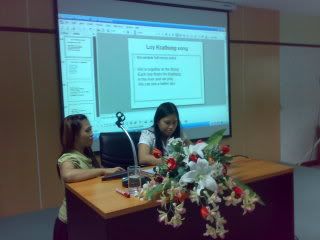A lesson in Thai Culture... the Woht - âËÇ´
The Woht (from Roiet, Issan 'Eesaan')  Last week I and others had the embarrassing experience of doing a 'Thai Cultural Course' at a nameless Bangkok University, as it is now a requisite for renewing your work permit.To begin, we were presented with a PowerPoint map which clearly showed Koh Chang in South Pattaya and a Thailand that was as wide as it was long (to fit nicely onto the slide...), we made paper dolls and paper planes and played Kindergarten English word games, and we were told that the cultural reason for not touching another person's head was that because someone might think you were something like a 'dirty old man'...Then there were the list of translations that we went through. For example, we were informed that to put äËà mai at the end of the sentence meant 'or not?' I would have thought that ÃÖà »ÅèÒ reu bplaao, or more formally, ËÃ×Ãà »ÅèÒ (reuu bplaao), or even ËÃ×Ã儤 reu yung or ËÃ×ÃäÃè reuu mai would have been a more accurate translation... To hear this from a person with a doctorate in English language was more than I could believe.Oh, and then they asked us to sing along with the words to the Loy Kratong song. The problem was that they had them all wrong and a lot of us knew them... At the end of the second line, the lecturer attempting to lead the singing stopped and asked why everyone was laughing. This is a picture of two of my Filipina colleagues fixing the slide for them from memory while the class AND the four lecturers sat and watched... and waited... and laughed... Then the wonderful Filipinas took the microphone and we belted it out with full gusto.
Last week I and others had the embarrassing experience of doing a 'Thai Cultural Course' at a nameless Bangkok University, as it is now a requisite for renewing your work permit.To begin, we were presented with a PowerPoint map which clearly showed Koh Chang in South Pattaya and a Thailand that was as wide as it was long (to fit nicely onto the slide...), we made paper dolls and paper planes and played Kindergarten English word games, and we were told that the cultural reason for not touching another person's head was that because someone might think you were something like a 'dirty old man'...Then there were the list of translations that we went through. For example, we were informed that to put äËà mai at the end of the sentence meant 'or not?' I would have thought that ÃÖà »ÅèÒ reu bplaao, or more formally, ËÃ×Ãà »ÅèÒ (reuu bplaao), or even ËÃ×Ã儤 reu yung or ËÃ×ÃäÃè reuu mai would have been a more accurate translation... To hear this from a person with a doctorate in English language was more than I could believe.Oh, and then they asked us to sing along with the words to the Loy Kratong song. The problem was that they had them all wrong and a lot of us knew them... At the end of the second line, the lecturer attempting to lead the singing stopped and asked why everyone was laughing. This is a picture of two of my Filipina colleagues fixing the slide for them from memory while the class AND the four lecturers sat and watched... and waited... and laughed... Then the wonderful Filipinas took the microphone and we belted it out with full gusto. Then at the end we had to do presentations. The farang participants in the course rose to the task with delight and made glowing presentations on Thai culture from their years of experience and travels here. I am not sure what was the most embarrassing. So when I got to do mine, the topic allocated to me was 'Music'. It so happens I am a musician... I brought in a Woht from Roiet and played an Issan tune. Then I asked if anyone knew what the instrument was, as there are not so many common instruments in Thailand (as we have in the West) and this one was popular enough. None of the farangs knew of course. I turned to the four knowledgeable lecturers. Desperate guesses. More desperate expressions. I saved them and told them. Then I asked if they knew where in Thailand it came from. No idea. When I said that it came from Roiet, one of them thought they would save face and made a suggestion that it most likely came from the South. I said, "No, it is definitely an Issan instrument, and if you went to Muang Roiet, you could see huge statues of them around their beautiful central park in the city." Below is one of the photos I took there.
Then at the end we had to do presentations. The farang participants in the course rose to the task with delight and made glowing presentations on Thai culture from their years of experience and travels here. I am not sure what was the most embarrassing. So when I got to do mine, the topic allocated to me was 'Music'. It so happens I am a musician... I brought in a Woht from Roiet and played an Issan tune. Then I asked if anyone knew what the instrument was, as there are not so many common instruments in Thailand (as we have in the West) and this one was popular enough. None of the farangs knew of course. I turned to the four knowledgeable lecturers. Desperate guesses. More desperate expressions. I saved them and told them. Then I asked if they knew where in Thailand it came from. No idea. When I said that it came from Roiet, one of them thought they would save face and made a suggestion that it most likely came from the South. I said, "No, it is definitely an Issan instrument, and if you went to Muang Roiet, you could see huge statues of them around their beautiful central park in the city." Below is one of the photos I took there. At the end, one of the lecturers was gracious enough to give credit to the presentations and admitted that he was humbled that he not only could name the instrument and its origin, but he had never heard one played before. Full marks to the honesty that comes with being prepared to lose face gracefully.I hope that you all enjoyed my little Thai Culture lesson today.
At the end, one of the lecturers was gracious enough to give credit to the presentations and admitted that he was humbled that he not only could name the instrument and its origin, but he had never heard one played before. Full marks to the honesty that comes with being prepared to lose face gracefully.I hope that you all enjoyed my little Thai Culture lesson today. 






0 Comments
Recommended Comments